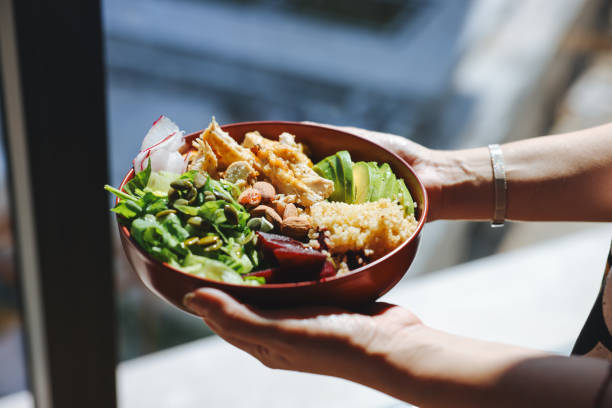Protein is one of the most essential nutrients for the human body. It helps build muscles, repair tissues, create enzymes and hormones, and support immunity. While non-vegetarians often get protein easily from meat and fish, vegetarians must be more mindful about their sources.
There’s a common myth that vegetarians can’t get enough protein—but the truth is, with the right food choices, a vegetarian diet can easily meet daily protein needs. This article explores the importance of protein in a vegetarian lifestyle, top sources, daily requirements, and how to combine foods for complete nutrition.
Why Protein Matters
Protein plays a critical role in nearly every bodily function:
- Muscle building and repair
- Healthy skin, hair, and nails
- Immune system function
- Hormone production
- Satiety and weight management
Without adequate protein, you may feel tired, lose muscle mass, have poor concentration, or suffer from slow recovery after exercise.
How Much Protein Do You Need?
🍏 Struggling with Weight or Digestion? Try This Natural Solution
Apple cider vinegar has been used for centuries for weight loss, better digestion, clearer skin, and natural detox. If you’re curious about how to use it safely and effectively, this detailed guide covers everything — benefits, dosages, and simple recipes.
👉 Discover the Apple Cider Vinegar Benefits Here
Whether you’re starting your fitness journey or just want to feel healthier naturally, this guide can help.
Daily protein requirements vary depending on age, activity level, and goals:
- General adult (sedentary): 0.8 grams per kg of body weight
- Active individuals or athletes: 1.2 to 2.0 grams per kg
- Teenagers, pregnant women, and older adults often need more
For example, a 60 kg adult should aim for 48–60 grams of protein per day. If they exercise regularly, that number could go up to 90–120 grams.
Can a Vegetarian Diet Provide Enough Protein?
Yes, absolutely.
There are plenty of high-protein vegetarian foods that, when consumed correctly, can meet your daily needs. The key is variety and combining complementary sources to ensure you’re getting all essential amino acids.
Unlike most animal proteins, many plant proteins are incomplete, meaning they lack one or more essential amino acids. But by mixing different plant-based foods—like grains with legumes—you can still achieve complete protein intake.
Top Vegetarian Protein Sources
Here are the best vegetarian-friendly sources of protein:
1. Lentils (Dal)
- ~9 grams protein per 100g (cooked)
- Rich in fiber and iron
2. Chickpeas and Beans
- ~8–9 grams protein per 100g (cooked)
- Excellent for curries, salads, or hummus
3. Soy Products (Tofu, Tempeh, Soy Milk)
- Tofu: ~10g per 100g
- Tempeh: ~19g per 100g
- Complete protein and rich in calcium
4. Quinoa
- ~8 grams per cup (cooked)
- A rare plant-based complete protein
5. Paneer (Cottage Cheese)
- ~18 grams per 100g
- High in casein protein, good for muscle repair
6. Greek Yogurt
- ~10 grams per 100g
- Supports gut health too
7. Oats
- ~5 grams per 100g (cooked)
- Great when paired with milk, nuts, or chia seeds
8. Nuts and Seeds
- Almonds: 6g per 28g
- Chia seeds: 5g per 2 tbsp
- Flaxseeds, pumpkin seeds also high in protein
9. Eggs (if ovo-vegetarian)
- ~6 grams per egg
- Complete protein with essential nutrients
10. Protein Supplements
- Plant-based protein powders (pea, soy, brown rice)
- Useful for meeting needs if you’re training hard
Combining Foods for Complete Protein
To get all essential amino acids, try these food pairings:
- Rice + Lentils
- Chapati + Chickpeas
- Peanut butter + Whole grain bread
- Hummus (chickpeas) + Pita (wheat)
- Oats + Milk + Nuts
These combinations ensure your body gets a full amino acid profile, just like meat.
Signs You May Need More Protein
Even with a vegetarian diet, some people fall short on protein without realizing it. Watch out for signs like:
- Feeling tired or weak
- Hair thinning or skin issues
- Poor workout recovery
- Frequent hunger
- Muscle loss despite exercise
If you notice these symptoms, increase your intake or track your macros for a few days.
Protein for Specific Goals
For Muscle Gain
- Aim for 1.6–2.0 grams per kg
- Include protein in every meal
- Use protein powder post-workout if needed
For Weight Loss
- High-protein diets increase satiety and reduce cravings
- Protein helps preserve muscle mass while losing fat
For General Health
- Balance protein with fiber, healthy fats, and complex carbs
- Eat a mix of legumes, dairy, grains, and nuts daily
Common Mistakes to Avoid
- Relying only on dal and skipping other sources
- Ignoring portion sizes—small servings may not be enough
- Eating too much processed “veg” food (mock meats, fried soy snacks)
- Skipping protein at breakfast
Build meals around balanced macronutrients, and you’ll see better energy and health.
Conclusion
Protein is essential for everyone—vegetarians included. With the right mix of whole foods, smart meal planning, and variety, it’s entirely possible to meet your protein needs without eating meat.
Whether your goal is to stay fit, lose weight, or gain strength, protein should be a non-negotiable part of your vegetarian diet. Start with small, intentional choices—like adding a handful of seeds to your breakfast or including dal and curd in your lunch and you’ll soon feel the difference in your energy, muscle tone, and overall well-being.

